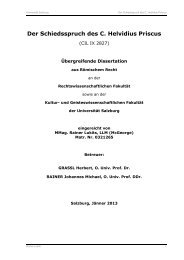(post) Keck Case Law on the Freedom to Provide Services
(post) Keck Case Law on the Freedom to Provide Services
(post) Keck Case Law on the Freedom to Provide Services
Create successful ePaper yourself
Turn your PDF publications into a flip-book with our unique Google optimized e-Paper software.
mutual recogniti<strong>on</strong>. 10 According <strong>to</strong> this, Member States are prohibited from restricting <strong>the</strong>sale of goods that have been lawfully produced under <strong>the</strong> rules of ano<strong>the</strong>r Member State.The restricti<strong>on</strong> is prohibited even if it results from <strong>the</strong> applicati<strong>on</strong> of nati<strong>on</strong>al regulati<strong>on</strong>sthat do not distinguish between nati<strong>on</strong>al and imported products (indistinctly applicablemeasures). The principle of mutual recogniti<strong>on</strong> seeks <strong>to</strong> prevent putting a double burden<strong>on</strong> imported products by requiring <strong>the</strong>m <strong>to</strong> comply with two different sets of rules. If <strong>the</strong>product complies with <strong>the</strong> home State rules, any o<strong>the</strong>r Member State must in generalaccept that product <strong>on</strong> its market.C<strong>on</strong>troversy arises when <strong>the</strong> principle of mutual recogniti<strong>on</strong> and <strong>the</strong> principle of homeState c<strong>on</strong>trol are used syn<strong>on</strong>ymously. 11 In a broad interpretati<strong>on</strong> mutual recogniti<strong>on</strong> isdefined as a mechanism of allocati<strong>on</strong> of regula<strong>to</strong>ry competence <strong>to</strong> <strong>the</strong> country of origindesigned <strong>to</strong> avoid a dual regula<strong>to</strong>ry burden. 12 O<strong>the</strong>rs put <strong>the</strong> focus <strong>on</strong> functi<strong>on</strong>alparallelism and <strong>the</strong> created fur<strong>the</strong>r regula<strong>to</strong>ry space for <strong>the</strong> host State c<strong>on</strong>trol through <strong>the</strong>creati<strong>on</strong> of <strong>the</strong> manda<strong>to</strong>ry requirements excepti<strong>on</strong>. 13 The host State can invoke those10Recently, as part of <strong>the</strong> Commissi<strong>on</strong>’s 2007 “Package <strong>on</strong> Internal Market for Goods” <strong>the</strong> MutualRecogniti<strong>on</strong> Regulati<strong>on</strong> has been adopted (Regulati<strong>on</strong> 764/2008, [2008] OJ L218/21). It basicallyrequires a dialogue between <strong>the</strong> host State and <strong>the</strong> ec<strong>on</strong>omic opera<strong>to</strong>r whenever <strong>the</strong> host State has takenor intends <strong>to</strong> take measures regarding product requirements.11For an overview of <strong>the</strong> c<strong>on</strong>troversy see for example Fichtner, “The Rise and Fall of <strong>the</strong> Country ofOrigin Principle in <strong>the</strong> EU’s <strong>Services</strong> Directive – Uncovering <strong>the</strong> Principle’s Premises and PotentialImplicati<strong>on</strong>s”, 54 Essays in Transnati<strong>on</strong>al Ec<strong>on</strong>omic <str<strong>on</strong>g>Law</str<strong>on</strong>g> (2006), 1, at 12 ff.12See Bernard, “Flexibility in <strong>the</strong> European Single Market” in Barnard/Scott (Eds.), <str<strong>on</strong>g>Law</str<strong>on</strong>g> of <strong>the</strong> SingleEuropean Market (Oxford, 2002), p. 101, at p. 105.13See for example Weiler, “The C<strong>on</strong>stituti<strong>on</strong> of <strong>the</strong> Comm<strong>on</strong> Market Place: Text and C<strong>on</strong>text in <strong>the</strong>Evoluti<strong>on</strong> of <strong>the</strong> Free Movement of Goods” in Craig/De Búrca (Eds.), The Evoluti<strong>on</strong> of EU <str<strong>on</strong>g>Law</str<strong>on</strong>g> (OUP,1999), p. 349, at pp. 365 ff; Armstr<strong>on</strong>g, “Mutual Recogniti<strong>on</strong>” in Barnard/Scott (Eds.), <str<strong>on</strong>g>Law</str<strong>on</strong>g> of <strong>the</strong>Single European Market (Oxford, 2002), p. 225, at pp. 235 f; Wea<strong>the</strong>rill, “Pre-empti<strong>on</strong>, Harm<strong>on</strong>isati<strong>on</strong>4




